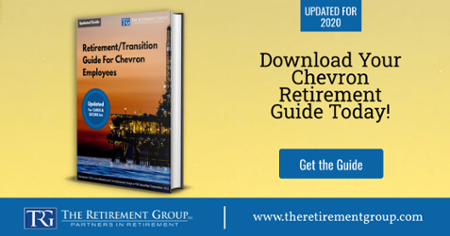In my many years of recruiting experience I've realized that taxes have a major impact on people's decision making. It's my job to put people in the best position for them to succeed. I've noticed my Chevron clients in particular are always looking for ways to maximize their tax deductions.
Given the current market we could all benefit from a tax reduction strategy. While I'm not a a tax expert or financial advisor, I have done some research and here's an interesting strategy I thought Chevron employees would appreciate.
Net Unrealized Appreciation (NUA)
When a Chevron employee qualifies for a distribution they have three options:
- Roll-over your qualified plan to an IRA and continue deferring taxes
- Take a distribution and pay ordinary income tax on the full amount
- Take advantage of NUA and reap the benefits of a more favorable tax structure on gains
How does Net Unrealized Appreciation work?
First an employee must be eligible for a distribution from their qualified plan; generally at retirement or age 59 1⁄2, the employee takes a "lump-sum" distribution from the plan, distributing all assets from the plan during a 1 year period. The portion of the plan that is made up of mutual funds and other investments can be rolled into an IRA for further tax deferral. The highly appreciated company stock is then transferred to a non-retirement account.
The tax benefit comes when you transfer the company stock from a tax-deferred account to a taxable account. At this time you apply NUA and you incur an ordinary income tax liability on only the cost basis of your stock. The appreciated value of the stock above its basis is not taxed at the higher ordinary income tax but at the lower long-term capital gains rate, currently 15%. This could mean a potential savings of 20%. Let's take a look at an example.
Net Unrealized Appreciation Example
Let's assume the value of Chevron stock within your account is $500,000. The price you paid for the stock is $75,000. If you roll the entire amount to an IRA you will owe nothing in taxes presently. Over time if you were in the 28% federal tax bracket you will pay $140,000 in taxes for distributions.
If you were to take advantage of NUA you will pay ordinary income tax on the cost basis at the time of distribution. This totals $21,000 in taxes today. The tax on the Net unrealized Appreciation would be 15% of the gain, or $63,750. Your total tax liability is $84,750.
In this example, NUA saved over $20,000 in taxes!
A few things to keep in mind:
- Chevron employees taking a distribution prior to age 59 1⁄2 may be subject to a 10% penalty.
- NUA makes more sense when employees have a low cost basis. If you own "ESOP" shares of CVX, it's almost certain you will be able to take advantage of the NUA tax strategy, as these shares carry a lower cost basis than the CVX common stock.
- It is important to take advantage of NUA prior to a rollover. Once you roll retirement assets to an IRA it is too late to take advantage of the potential savings. To qualify, you must be eligible for a lump-sum distribution of your entire qualified account.
- Stock shares must transfer in-kind to a taxable account. This means that the shares must not sell but must move from your qualified account into your new taxable account.
Net Unrealized Appreciation can be used in certain circumstances to save a substantial amount in taxes. Make sure that your consult with your tax and financial professionals to ensure that this is a good fit.
If you are looking for more details about your benefits, reach us at TechStaffer.
Have questions about your 401(k)? Visit: https://techstaffer.blog/2020/02/12/have-you-looked-at-your-401k-plan-recently-2/
Curious about Social Security and Medicare? Visit: https://techstaffer.blog/2020/02/26/chevron-social-security-and-medicare/
Sources:
- The Retirement Group or www.theretirementgroup.com
- “Retirement Plans-Benefits & Savings.” U.S. Department of Labor, 2019, www.dol.gov/general/topic/retirement.
- “Generating Income That Will Last throughout Retirement.” Fidelity, 22 Jan. 2019, www.fidelity.com/viewpoints/retirement/income-that-can-last-lifetime.




